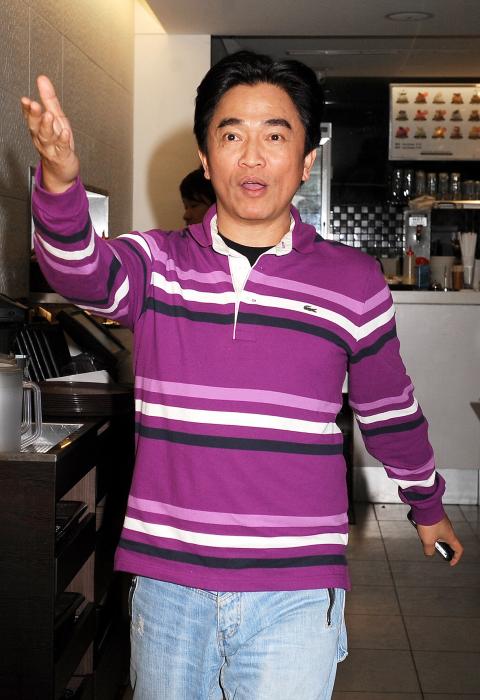Unlike many of her celebrity peers, Singaporean starlet Joanne Peh (白薇秀) has carefully cultivated a low-key, girl-next-door image.
The actress, who has said her favorite books include Pride and Prejudice and Great Expectations, will take the stage with other performers at the end of this month for the Thye Hua Kwan Charity Show, a televised fund-raiser for the Singapore-based Thye Hua Kwan Moral Society, whose services include providing free meals for the poor and counseling for gamblers.
At a press conference last week, held to plug the event, Peh told assembled media that she would perform a belly-dance routine in the hope of helping to raise the target amount of NT$90 million. Intelligent, community-minded and hard working: Will these qualities help Peh reach the big time? Only time will tell.

Photo: Taipei Times
Also stumping for a good cause last week was Taiwanese actress Annie Yi (伊能靜). She bared all at a press conference in Beijing last week for the US-based animal-rights group People for the Ethical Treatment of Animals (PETA) and declared that she would “rather go naked than wear fur,” our sister paper the Liberty Times reported.
A little digging under the surface, however, reveals that this is the same celebrity who bragged to the media in 2005 that she owned a closet full of fur coats — a statement she later retracted after receiving a barrage of criticism from animal rights groups.
Hitting the nail on the head, she told the assembled media: “I was once ignorant and loved the luxury and extravagance of fur. But now I understand that animals are tortured to make fur coats, so I’ll no longer wear them.”
While Yi is prepared to let it all hang out, Taiwanese singer-actor Jerry Yan (言承旭) is keeping his cards close to his chest. Returning from a meet and greet in Japan over the weekend, Yan was bombarded with questions by reporters who wanted to know if he had met up with rumored flame Lin Chi-ling (林志玲), who is in Japan filming the upcoming drama The 101th Proposal (101次求婚).
The reporters were particularly interested in Yan’s response as Lin’s father had recently dubbed him “the light of Taiwan” (台灣之光) because of his popularity and charity work. Yan ignored all the questions and was quickly bundled into a waiting car.
And finally, it’s official: funnyman Jackie Wu (吳宗憲) might be retiring from the entertainment business. At least that’s what he promised to do in the summer of last year if he were found guilty of fraud.
The Liberty Times reported that the accusation stemmed from a business deal with Hsu Fang-yang (許豐揚), who was suspected of misappropriating funds from his company to invest in Wu’s LED company.
At the time Wu, one of Taiwan’s most popular and highly paid entertainers, and who has been involved in several failed business ventures, had blubbered that he’d done nothing wrong and never lied to his fans.
Ah, but what a difference a year makes. Prosecutors met up with Wu on Tuesday for a chat because they suspect that he made several false transactions and had illegally pocketed NT$12.5 million.
They later indicted the variety show host, who now faces up to 10 years in jail.
Predictably, Wu told a press conference on Wednesday that prosecutors didn’t have all the facts and denied any wrongdoing.
“I definitely, definitely didn’t do anything illegal,” he said.
Perhaps Wu should seek some help from the Thye Hua Kwan Moral Society.

In the March 9 edition of the Taipei Times a piece by Ninon Godefroy ran with the headine “The quiet, gentle rhythm of Taiwan.” It started with the line “Taiwan is a small, humble place. There is no Eiffel Tower, no pyramids — no singular attraction that draws the world’s attention.” I laughed out loud at that. This was out of no disrespect for the author or the piece, which made some interesting analogies and good points about how both Din Tai Fung’s and Taiwan Semiconductor Manufacturing Co’s (TSMC, 台積電) meticulous attention to detail and quality are not quite up to

April 21 to April 27 Hsieh Er’s (謝娥) political fortunes were rising fast after she got out of jail and joined the Chinese Nationalist Party (KMT) in December 1945. Not only did she hold key positions in various committees, she was elected the only woman on the Taipei City Council and headed to Nanjing in 1946 as the sole Taiwanese female representative to the National Constituent Assembly. With the support of first lady Soong May-ling (宋美齡), she started the Taipei Women’s Association and Taiwan Provincial Women’s Association, where she

Chinese Nationalist Party (KMT) Chairman Eric Chu (朱立倫) hatched a bold plan to charge forward and seize the initiative when he held a protest in front of the Taipei City Prosecutors’ Office. Though risky, because illegal, its success would help tackle at least six problems facing both himself and the KMT. What he did not see coming was Taipei Mayor Chiang Wan-an (將萬安) tripping him up out of the gate. In spite of Chu being the most consequential and successful KMT chairman since the early 2010s — arguably saving the party from financial ruin and restoring its electoral viability —

It is one of the more remarkable facts of Taiwan history that it was never occupied or claimed by any of the numerous kingdoms of southern China — Han or otherwise — that lay just across the water from it. None of their brilliant ministers ever discovered that Taiwan was a “core interest” of the state whose annexation was “inevitable.” As Paul Kua notes in an excellent monograph laying out how the Portuguese gave Taiwan the name “Formosa,” the first Europeans to express an interest in occupying Taiwan were the Spanish. Tonio Andrade in his seminal work, How Taiwan Became Chinese,